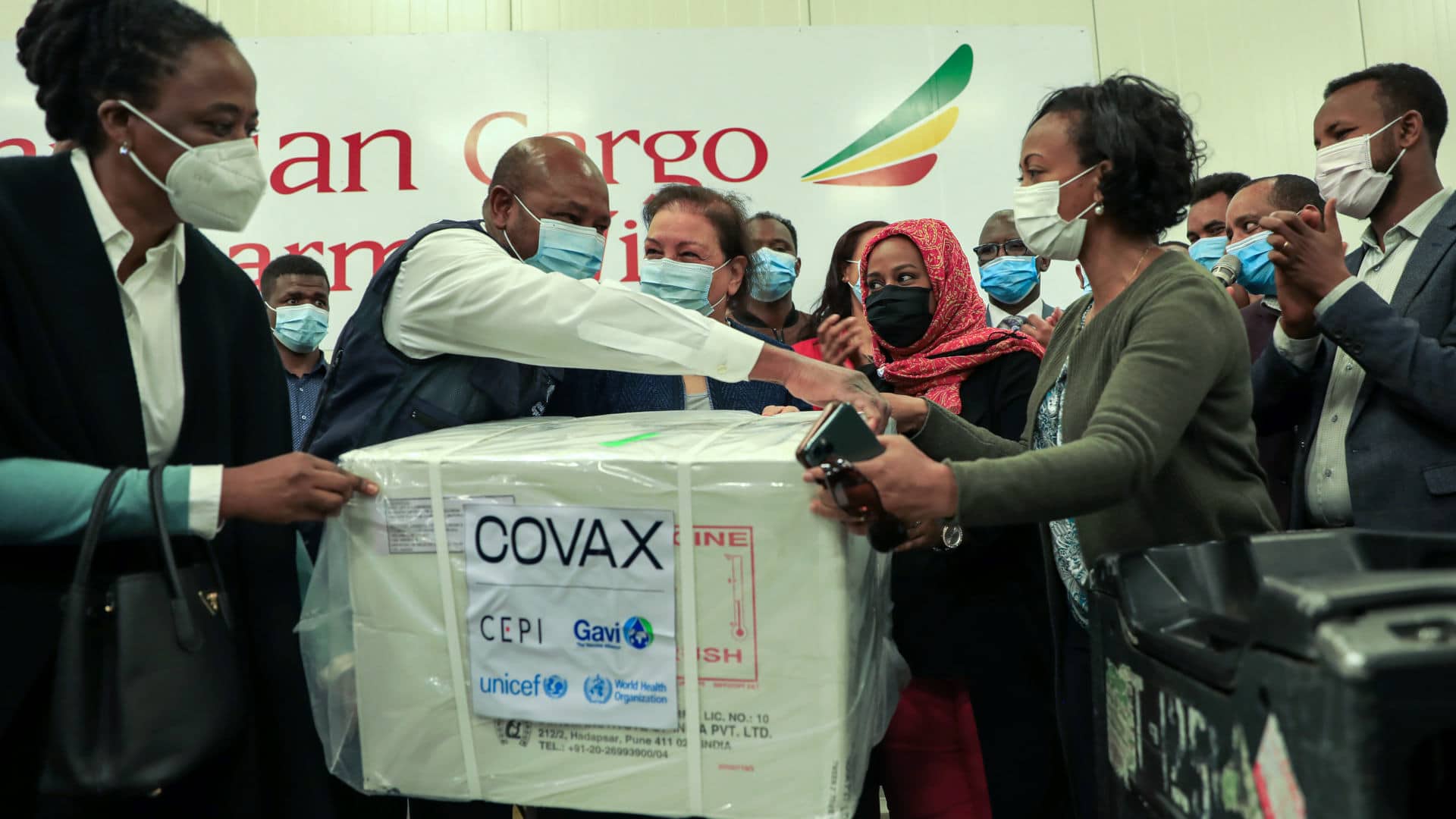Amid the spread of new coronavirus variants and breakthrough Covid-19 cases, tensions over global vaccine equity grew this week as Germany and other wealthy countries announced plans to offer already-vaccinated adults an additional dose, or booster shot, of Covid-19 vaccine.
“Even while hundreds of millions of people are still waiting for their first dose, some rich countries are moving toward booster doses,” World Health Organization director-general Tedros Adhanom Ghebreyesus said during a media briefing on Wednesday, later noting that “low-income countries have only been able to administer 1.5 doses for every 100 people, due to a lack of supply.” In response, the WHO called for a global moratorium on booster shots through, at earliest, late September.
While Covid-19 vaccines remain strongly protective against severe disease, there is evidence that the immune protection they offer may wane with time, even for people with healthy immune systems. As a result, experts say, it is possible — although the exact benefit remains uncertain — that giving some people a booster shot now could bolster their defenses against the virus. (Confusingly, the term “booster shots” is also sometimes used to describe next-generation Covid-19 vaccines that have been tweaked to offer better protect against new variants. Such shots are not yet available to the public, and what’s at issue here are simply additional doses of existing immunizations.)
The WHO has no power to enforce its moratorium. In addition to Germany, Israel, France, and the United Kingdom have all recently announced plans to offer boosters, mostly to older people. While the United States has not yet followed suit, some public health experts have expressed the need for boosters for a small number of people who are immunocompromised, because protection from the shots wears off more quickly in this vulnerable population. And White House press secretary Jen Psaki disputed the WHO’s claims this week, saying there was sufficient vaccine supply to offer booster shots to Americans and also fulfill the country’s commitments to help abroad. Already, some U.S. health care providers are noticing people trying to secure unauthorized third doses.
Global health care inequities are nothing new. (In 2018, to give one example, the U.S. spent around 250 times more money per person on health care than Uganda.) Wealthy countries have long offered their citizens access to medical resources and procedures unavailable in other parts of the world. One reason the vaccine inequities may be raising such outcry is that they make these disparities so immediately tangible — and that a Covid-19 outbreak, unlike some other diseases that plague poor countries, can quickly cross national boundaries.
Indeed, setting the ethical questions aside, some experts are skeptical that amplifying the already-substantial immunity of the world’s vaccinated minority, before offering basic protection to the unvaccinated majority, is even responsible public health policy. “New variants are most likely to arise in unvaccinated populations,” Johns Hopkins University international health expert Ruth Karron told NPR this week. “So the more of the world that’s unvaccinated, the more we are all at risk.”
Also in the News:
• On Tuesday, a bipartisan group of U.S. senators introduced legislation aimed at expanding the government’s investigation of so-called Havana Syndrome, characterized by a series of mysterious ailments that have affected American diplomats and personnel around the globe. The condition was first reported by U.S. and Canadian diplomatic officials in Havana, Cuba, in late 2016. Afflicted individuals report hearing what Forbes has described as “a high-pitched, grating noise,” followed by symptoms that can include hearing loss, cognitive decline, and brain damage. Since 2016, incidents have also been reported by officials in China, Poland, Russia, Australia, and several more countries, as well as in Washington, D.C. While some analysts have speculated that the condition could be psychosomatic, many experts now point to directed energy attacks from sophisticated weapons as a likely culprit. “U.S. public servants injured by directed energy attacks should be treated with the same urgency as any other American injured in the line of duty,” said Sen. Jeanne Shaheen, a Democrat from New Hampshire, who co-sponsored the bill with Maine Republican Sen. Susan Collins. Their proposal would establish a new White House National Security Council position, dubbed the Anomalous Health Incidents Interagency Coordinator, to oversee the U.S. government’s ongoing investigations into the syndrome. Should the legislation pass, all U.S. agencies involved in the current investigation would be required to appoint a senior-level official to oversee Havana Syndrome incidents. (Politico)
• When President Joe Biden announced his infrastructure bill earlier this year, he earmarked a big chunk for science and research — including $30 billion for protecting the U.S. against future pandemics. Now, as Congress hashes out the details of the bill, the amount for pandemics has been drastically cut, as The Atlantic reported this week. The funds were intended, in part, to pay for medical stockpiles, prototype vaccines for a range of likely pandemic candidates, the development of tests and treatments, and production of masks and respirators within the U.S. Although the new amount allocated for pandemic preparedness isn’t final, according to The Atlantic, “it is significantly less than requested.” Public health experts and advocates expressed dismay at the news. “Public health has been chronically underfunded,” Gabriel Bankman-Fried, the executive director of the nonprofit Guarding Against Pandemics, told The Atlantic. “But prevention is always better than treatment, and the fact that, after an event as significant as Covid, we have to fight for this $30 billion defies belief.” (The Atlantic)
• For consumers seeking to reduce the waste generated by single-use plastics, TerraCycle would seem to offer a unique solution. The New Jersey-based company offers a mail-in program for difficult-to-recycle items including plastic cups, packaging, action figures, and more. It also partners with corporations like Proctor and Gamble, Clorox, and Tom’s of Maine to provide brand-specific recycling programs. But, as Vox reports this week, despite TerraCycle’s accolades, some activists say participating is onerous for consumers and that the company does little to reduce waste by any meaningful metric. Environmental advocates have also raised questions about where the waste ends up: In March, a nonprofit group dedicated to ending plastic pollution filed a lawsuit against TerraCycle and many of its partners, alleging that they are not being transparent with consumers about the recyclability of their products. While the company’s founder told Vox that TerraCycle recycles all eligible materials that it receives, the suit “seeks to force TerraCycle and its partners to stop using the TerraCycle recyclable symbol on products that it hasn’t proven are easily recyclable by at least 60 percent of consumers.” (Vox)
• And finally: Why would a peer-reviewed article refer to cloud computing as “haze figuring,” or to artificial intelligence as “counterfeit consciousness”? A group led by University of Toulouse researcher Guillaume Cabanac began to ponder that question earlier this year, when they stumbled upon those and other curious terms in computer science papers. Phrases like “big data” were replaced with “colossal information”; “signal to noise” was described as “flag commotion.” As Holly Else now reports in Nature, experts think these unartful constructions — termed “tortured phrases” — could be a harbinger of “a very new and disturbing type of fabricated paper.” In a preprint paper published on arXiv last month, Cabanac and his colleagues posited that the bungled expressions might be artifacts of automated translation or computer-assisted attempts to disguise plagiarism. They identified 30 tortured phrases in all, and a subsequent search of a popular citation database turned up more than 860 papers that contained at least one of the phrases. Even that tally might be underselling the extent of the problem, University of Sydney researcher Jennifer Byrne told Nature. “There could be more plausible AI-generated papers within the literature that are harder to detect,” she said. (Nature)
“Also in the News” items are compiled and written by Undark staff. Brooke Borel, Lucas Haugen, Jane Roberts, and Ashley Smart contributed to this roundup.










